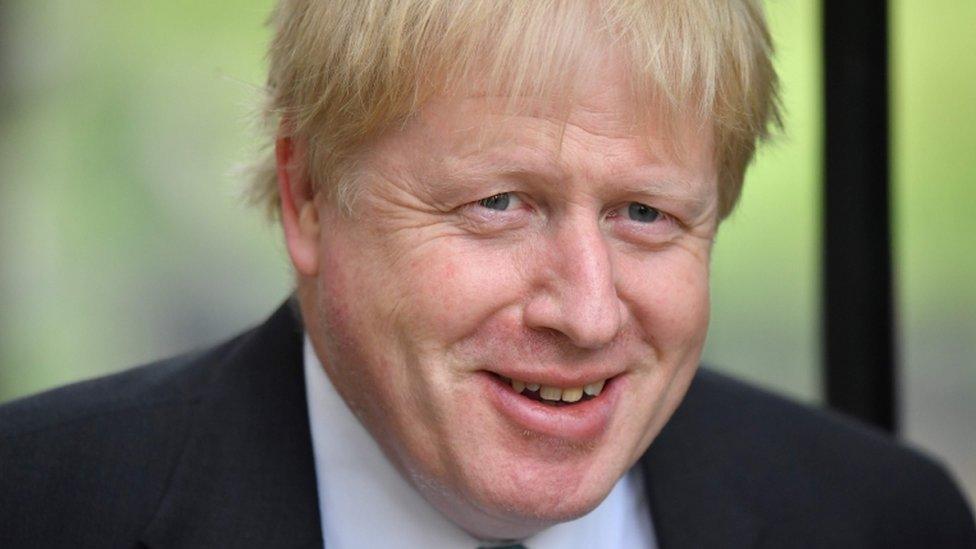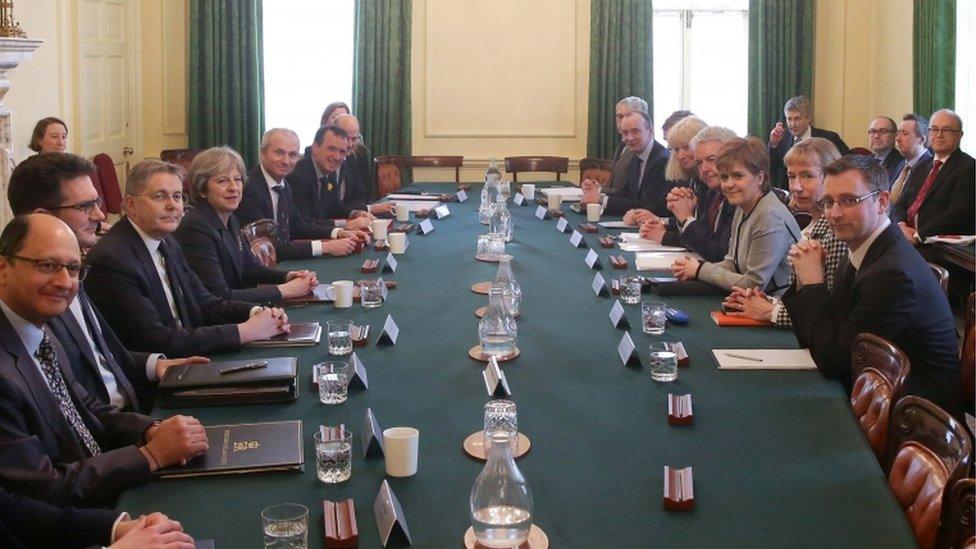Sturgeon issues 'uncharted territory' warning over Brexit bill
- Published
- comments

Ms Sturgeon is at the SNP conference in Aberdeen, which opened with Keith Brown (right) winning the contest to be her deputy as party leader
Nicola Sturgeon has warned the UK government that pushing through the Brexit bill without Holyrood's consent would put the UK into "uncharted" constitutional territory.
MPs in the House of Commons are expected to hold a final vote on the EU Withdrawal Bill next week.
But there is still no agreement between the Scottish and UK governments over the devolved elements of the bill.
UK government sources told BBC Scotland they are likely to press on regardless.
The Scottish Parliament voted against giving its formal consent to the bill last month, with Labour MSPs, Liberal Democrats and the Scottish Greens supporting the SNP's stance.
Months of talks between the Westminster and Holyrood governments have failed to find a solution to the dispute, despite the Welsh government agreeing a deal that ended its opposition to the proposals.
Ms Sturgeon, the Scottish first minister, said ignoring the result of the Holyrood vote would "rip up" the convention that the UK Parliament will not legislate in devolved areas without the consent of the devolved parliament.
There is no constitutional reason why the UK government cannot do so, but it would be politically difficult for the prime minister.
Ms Sturgeon told the BBC's Good Morning Scotland programme that the move would be "regrettable" and would take the country into uncharted constitutional territory.
'Retrograde step'
And she predicted the implications of Westminster "seeking to impose" unpopular policies in devolved areas after Brexit would be "hugely significant".
She added: "I hope the Westminster government even at this late stage will respect the Scottish Parliament because I don't know where it takes us if they are prepared to rip up this convention.
"It takes us into uncharted territory and I think it will be a seriously retrograde step.
"Decision time is looming for the Conservative government. They can respect the Scottish Parliament or they can do what a lot of people in Scotland have long suspected - prove that they can't be trusted with devolution."

In a recording obtained by Buzzfeed, Boris Johnson criticised the government's Brexit negotiating strategy and praised Donald Trump
The first minister also said UK Foreign Secretary Boris Johnson had "no credibility whatsoever" after he criticised the UK government's Brexit talks strategy as lacking "guts" and suggested Donald Trump could do a better job.
Ms Sturgeon said: "It speaks volumes that Theresa May cannot get rid of Boris Johnson or any other of her Cabinet members who are causing so much difficulty because of the weakness at the heart of her position."
She was speaking as delegates gathered in Aberdeen for the SNP's two-day spring conference, which she will being to a close with her speech on Saturday afternoon.
The conference opened with the result of the party's deputy leadership contest being announced, with Economy Secretary Keith Brown winning the contest to succeed Angus Robertson in the role.
What is the Brexit "power grab" row?

Months of talks between the two governments have failed to reach an agreement
The UK government has published proposals that would see the "vast majority" of the 158 areas where policy in devolved areas is currently decided in Brussels go directly to the Scottish and Welsh parliaments after Brexit.
But it has also named 24 areas where it wants to retain power temporarily in the wake of Britain's exit from the EU, including in areas such as agriculture, fisheries, food labelling and public procurement.
It says the "temporary restriction" on the devolved governments using some of the powers returning from the EU is needed "to help ensure an orderly departure from EU law" and allow the same rule and regulations to remain in place across the whole of the UK.
But the Scottish government argues that it would leave Holyrood unable to pass laws in some devolved areas for up to seven years.
It has produced its own alternative Brexit legislation, which was passed by MSPs in March but is currently subject to a legal challenge by the UK government.